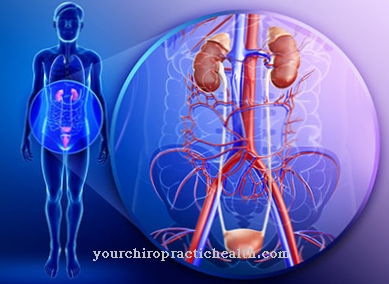At work there are people with a schizoid personality disorder often brilliant at logical and abstract thinking. Problems are more likely to arise when they are more closely related to other people.
What is schizoid personality disorder?

© Gorodenkoff - stock.adobe.com
From one schizoid personality disorder speaks psychology when people have problems establishing social contacts with other people, whereby the boundaries between personal characteristics and a disorder are fluid. People with schizoid personality disorder appear cool, aloof, emotionally distant to other people, and have difficulty expressing their feelings appropriately.
They tend to avoid contact with other people and take refuge in fantasies, perhaps to compensate for the lack of social environment. In their professional life, they prefer activities in which they can work alone; constant teamwork is not for them. You long for closeness, but at the same time you are afraid of it. This can lead to a feeling of loneliness. Often, however, it is not so much the people affected who suffer from the disorder, but their social environment.
causes
Most personality disorders have a mixture of biological, genetic, and environmental influences. There appears to be a genetic predisposition, as schizoid personality disorder is more common in families with a family member's schizophrenia. Many people with this personality disorder are inherently very sensitive, coupled with a slight vulnerability.
Rigorous upbringing, neglect or emotional abuse can also play a role, as can a personality disorder in a parent. Psychoanalysts suspect negative attitudes or abuse by the parents or experiences of frustration with previous contacts. A possible cause could also be that the affected person can feel feelings such as fear and anger, but cannot express them adequately and therefore try to avoid contact.
Symptoms, ailments & signs
The boundaries between personal idiosyncrasies and a disorder are sometimes very fluid, with schizoid personality disorder it depends on whether the person affected is suffering from their withdrawal or whether they need it for their individual well-being. Psychology has identified nine possible symptoms that speak for a schizoid personality disorder:
- little pleasure in activities
- reduced affects, emotional detachment
- Difficulty expressing warm, tender feelings or anger
- apparent indifference to praise and criticism
- little interest in sexual experiences with others
- strong fantasies
- Prefer solitary activities
- low desire for close social relationships
- degraded feeling for social norms
Diagnosis & course of disease
Because the boundaries between personal traits and disorders are fluid, it is not easy to diagnose schizoid personality disorder. It is a challenge even for professionals such as physicians and doctors. According to the ICD 10 criteria catalog, at least three of the nine listed symptoms must be present for a reliable diagnosis. This is made more difficult by various circumstances. Two distinct symptoms are not enough, there must be three.
Some symptoms are similar to those of other psychological or neurological diagnoses, such as Asperger's syndrome, which must be excluded by the diagnosis. Sometimes multiple diagnoses are necessary because multiple disorders overlap and mask the schizoid personality disorder. The symptoms must not only appear briefly, but must be permanent.It is also difficult that many of those affected are able to compensate for behavioral problems, suppress them at times or hide them behind a facade.
Complications
The detachment that is typical of people with schizoid personality disorder can lead to misunderstandings, especially in social situations. Other people may perceive the detachment as disinterest or rejection. In addition, schizoid personalities often show limited feelings. They can therefore appear cold or numb to other people.
In some cases, their emotions and needs are not taken into account: on the one hand, many schizoid personalities do not express themselves explicitly enough in this regard, on the other hand, the expressions of feeling are sometimes misunderstood or ignored. Without constant friendships and relationships, schizoid personalities often feel excluded, misunderstood, and lonely. The flattened emotional reactions can also lead to problems in professional life.
People with schizoid personality disorder sometimes feel stigmatized. Misunderstandings are also possible if the schizoid personality disorder is confused with other mental illnesses, for example with Asperger's syndrome. Since schizoid personality disorder is rare and other diseases are also known to laypeople, such mix-ups occur frequently in everyday life. Complications can also arise during treatment if the differential diagnosis is not taken into account.
Other mental illnesses can develop as a complication. However, other mental disorders can occur simultaneously with or precede schizoid personality disorder. Many of those affected also suffer from (major) depression. With and without depression, suicidality can occur as a serious complication of schizoid personality disorder.
When should you go to the doctor?
People who have a schizoid personality usually do not realize this. They live in the belief that everything is fine with them. Rather, it is the environment that suffers from the symptoms of the personality disorder. Initiating a doctor's visit with the person concerned is extremely problematic. The relationship of trust must be very stable and be able to withstand stress so that a diagnosis can be made. However, a close relationship with another person is usually avoided by the person concerned.
Consultation with a doctor is recommended as soon as there are behavioral problems that are described as above the norm. Emotional injuries as well as the inability to work in a team or to be considerate towards other people are considered characteristic of the personality disorder. Reduced affects, decreased emotional participation in social interactions, and the development of vivid fantasies are cause for concern.
Indifference to strokes of fate, praise and criticism, the inability to exchange tender feelings and sexual apathy indicate irregularities in the human psyche. Going it alone in the professional field or being a loner in private life are further signs that are assigned to schizoid personality disorder. A doctor is always needed if the person concerned or relatives suffer from the disease.
Treatment & Therapy
The treatment of a schizoid personality disorder is usually carried out through depth psychological, psychoanalytic or cognitive-behavioral psychotherapy. Those affected are encouraged to make contact with other people and enjoy them. However, those affected rarely start therapy voluntarily because they usually see no need for action. In therapy they seem distant and uninvolved.
Therefore, the therapist must ensure a trusting relationship and more actively support the client. At the same time, he must be careful not to overwhelm the client with too much emotional work, instead respect the desire for distance and give him the opportunity to do written homework and email contact. The aim of psychoanalytically oriented psychotherapy is that those affected learn to make contact with other people again and to make these contacts reliable and satisfactory, while at the same time making living alone more satisfactory.
Cognitive behavioral therapy supports those affected to open up to emotional interpersonal experiences again and to better perceive their own feelings. In therapy, they also learn to deal with the feelings that they trigger in others through their rejecting behavior, and learn more appropriate strategies.
Group therapy can be useful to reduce social anxiety. But then you have to feel comfortable in the group. In cases of severe depression or delusions, psychotropic drugs are prescribed in parallel with psychotherapy, but the positive benefit has not yet been clearly demonstrated.
You can find your medication here
➔ Drugs for personality disordersprevention
There is usually no special prevention for personality disorders because they only develop in the course of life. When they do occur, it is important to identify them early so as not to pass pathological behavior on from one generation to the next. It is also helpful if those affected do not suddenly pull out of contact, but rather communicate their needs openly with their social environment.
Aftercare
Mental illnesses require professional aftercare even after successfully completing therapy. The symptoms accompany the person affected for years, in many cases for a lifetime. Especially after a psychiatric stay, the patient has to be integrated back into his everyday life and the familiar environment. He cannot take this step on his own. For this he needs the supportive help of a psychotherapist.
Schizoid personality disorders are accompanied by a noticeable withdrawal in themselves. The person concerned avoids acquaintances that he maintained before the onset of his illness. In the context of aftercare, it must be differentiated whether the social withdrawal is actually (still) due to illness or whether it is related to the personality of the patient.
If the patient breaks certain friendships, but appears satisfied, the therapist should accept the decision. A conscious break in contact may even be necessary for the person concerned to recover. Friends who do not take his illness into account or who cannot understand it as such have a negative effect on his emotional balance.
In the event of deterioration due to acute events, the treating specialist provides first aid. This professional contact point gives the sick person a feeling of security. This makes it easier for him to return to everyday life. Relatives of the person concerned can also contact the therapist with specific questions.
You can do that yourself
Clear instructions for self-help are rare for schizoid personality disorder, because this personality disorder on the one hand does not occur frequently and on the other hand is often associated with social withdrawal. These characteristics make close cooperation in self-help groups difficult.
In everyday life, people with a schizoid personality disorder often suffer from having only superficial contact with other people. In addition, their behavior is often misunderstood by other people. One approach to self-help can therefore consist in making one's own behavior understandable to the partner, family or other people close to them. One option is to verbalize your feelings when they cannot be expressed otherwise. Since schizoid personality disorder can lead to very different difficulties in everyday life, individual solutions are required. To identify such, it can be useful to ask confidants for feedback. What would help them to cope better with a (missing) reaction? It is important to understand that the schizoid personality disorder cannot be "switched off" in this way. However, it may become more understandable for the partner and other immediate family members.
How people best organize their everyday life with a schizoid personality disorder can also be discussed as part of the therapy. In behavior therapy in particular, therapists often give their patients homework in order to anchor the findings from the therapy sessions in everyday life.





.jpg)







.jpg)

.jpg)
.jpg)











.jpg)